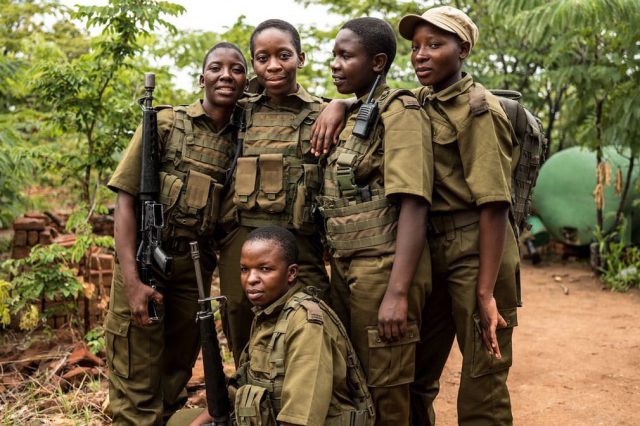National security wrap

The beat
Rifles in the streets?
Around 50 NSW riot squad officers have been issued with semi-automatic assault rifles—Colt M4 Carbines, to be exact. Intended to be deployed in terror incidents, the officers could also be called on to safeguard big public events, such as New Year’s Eve celebrations, ‘because of their deterrent effect’.
Aussie trains Zimbabwe’s female anti-poachers
Damien Mander, a former Australian Navy clearance diver and special operations sniper, is the founder of the International Anti-Poaching Foundation. In Zimbabwe, he started the Akashinga initiative, which enables unemployed women to become community leaders by joining the first armed, all-female anti-poaching combat unit. Tairo Manangagwa, the daughter of the country’s new president, Emmerson Mnangagwa, has lent her support to the initiative. Earlier this month, she spent time training with the women in their fight to end illegal hunting. This photo gallery captures the program of female empowerment and conservation skills development.
Negative press for US police—again
Yet another piece of disturbing footage has emerged of US police mishandling a black youth. Eleven-year-old Honestie Hodges found herself handcuffed at gunpoint by police in Grand Rapids, Michigan. An investigation has since been launched. It doesn’t seem like the city’s law officers learned any lessons from a highly criticised incident in March.
CT scan
Church attacked in Pakistan
A terrorist attack on a Methodist church in Pakistan’s Baluchistan province has killed at least nine people and injured at least 35. The attack was claimed by ISIS, which is particularly active in the area. It was a two-man attack: a suicide bomber detonated his bomb at the gate of the church, and a gunman opened fire on worshippers. The attack appears to have been an attempt to create religious division between Christian and Muslim Pakistanis.
UK increases CT funding
UK Home Secretary Amber Rudd has announced that UK police will receive an additional £50 million for counterterrorism activities. The extra funding will be used to boost the police presence in city centres and intelligence and surveillance capacities, allowing police ‘to meet head on the threat we face’. The move comes after the government was criticised by opposition leader Jeremy Corbyn for trying to ‘protect the public on the cheap’, following government plans to cut police funding.
Australian troops continue training Philippines’ marines
Australian Defence Force personnel have completed a series of training exercises with their Philippine counterparts. The training was designed to teach the Philippine forces new techniques of urban warfare. More training programs are expected to be held early in 2018.
Check point
Drawing economic borders, barriers
With Brexit negotiations in full swing, the implications for the future economic borders in Europe and beyond are still unclear. This slide was presented to EU leaders by chief negotiator Michel Barnier, presenting different options based on the UK’s positions. The RAND Corporation meanwhile developed a calculator that allows customised prediction of different trade scenarios for different regions (UK, EU, US). Have a go here.
Big spender Customs and Border Protection
Private firm Accenture has been awarded almost US$300 million by US Customs and Border Protection in a desperate measure to boost the force’s numbers. The company will help with recruiting 5,000 additional border patrol personnel, 2,000 customs officers and 500 agents for the Office of Air and Marine Operations. This mandate follows an executive order signed by President Trump and has drawn criticism already.
The other side of the coin
While the missile allegedly fired by Houthi rebels in Yemen and intercepted by Saudi Arabia made headlines earlier this week, a statement by the United Nations went almost unnoticed. According to a UN spokesperson, the Saudi-led coalition has intensified air strikes in the war-torn country, costing more and more civilian lives: between 6 and 16 December alone, the strikes killed 136 civilians and injured another 87. These pictures capture the immense suffering of the Yemeni population.
First responder
Army humanitarian moments
The US Army has released its top humanitarian moments of 2017. The demand for disaster assistance in the US was relentless this year, with hurricanes Harvey, Irma, and Maria requiring months-long responses involving thousands of troops. Even the California bushfires required involvement from the military, as the 1,900-strong force of the 49th Military Police Brigade controlled traffic and areas of entry. Likewise, this year Australia’s Army was also involved in many humanitarian assistance and disaster relief efforts, such as those in Vanuatu (video) and the Philippines (video).
Development aid struggles
While global poverty is falling overall, the poorest people in the most remote locations are still struggling. Ryan Briggs, assistant professor of political science at Virginia Tech, conducted a study of foreign development aid, concluding that it tends to find its way to urban and richer locations.
ADB to fund Pacific island resilience
The Asian Development Bank has announced it will provide US$15 million in financing to Samoa, Tonga and Tuvalu to improve resilience to disasters. The program, which is modelled on an ABD-supported initiative in the Cook Islands, aims to ‘facilitate faster early recovery and reconstruction’ to reduce the secondary economic and social costs of disasters.